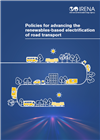

-
-
IRENA (2025), Policies for advancing the renewables-based electrification of road transport, International Renewable Energy Agency, Abu Dhabi
Copied
https://www.irena.org/-/media/Files/IRENA/Agency/Publication/2025/Jun/IRENA_POL_Policies_electrification_road_transport_2025.pdf
Copied
Policies for advancing the renewables-based electrification of road transport
Newsletter
Road transport – namely the use of cars, two- and three-wheelers, buses and trucks – plays an important role in the global energy transition. It represents more than three-quarters of the transport sector’s total energy consumption and is heavily reliant on fossil fuels, causing significant air pollution and threats to public health.
Electric vehicles (EVs) and charging infrastructure play a major role in driving the transition. According to IRENA’s 1.5°C Scenario, more than 90% of vehicle stocks and 80% of activity in road transport would need to be electric by 2050. However, the global deployment of EVs and chargers remains significantly below the required level. In 2024, EVs accounted for 20% of global vehicle market sales and less than 5% global vehicle stock.
Policies are needed to address existing barriers and accelerate the electrification process; they may include fuel efficiency standards, financial and fiscal incentives for the procurement of EVs and the installation of chargers, municipal-level incentives, as well as other measures to reduce the need for driving and shift to public transit and other low-carbon options. Meanwhile, policies can also be tailored for a specific type of road transport and its corresponding charging infrastructure. Small-scale financing opportunities and innovative business models can help electrify two- and three-wheelers in developing markets. Combining public transport projects with electric buses has been proven to be a promising approach. Support for charging corridors for long-haul freight may also encourage the deployment of electric truck fleets.
The electrification of road transport must be paired with renewable electricity and aligned with the global pledge to triple renewable energy capacity by 2030. Smart charging solutions can power EVs with renewable electricity and provide multiple services to the power system, including enabling a higher share of renewable electricity. But their development remains limited. Policymakers and utilities will need to adopt additional measures and improve power market regulations to create a favourable market environment for smart charging.




